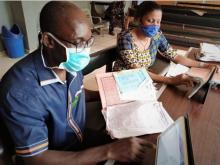WHO provides technical support to government on maternal and perinatal data surveillance
Abuja, 18 August, 2020 - The World Health Organization (WHO), in partnership with the Federal Ministry of Health (FMOH), has established a national database to collate and monitor the successes and death rate of maternal and perinatal cases in the Nigerian health sector.
Known as the Nigeria Maternal and Perinatal Database for Quality, Equity, and Dignity (MPD-4-QED), the programme is a standardized electronic platform for the collection, collation, and audits of routine maternal and perinatal data in tertiary level facilities nationwide.
The Director Family Health, FMOH, Dr Adebimpe Adebiyi during the launch of the programme in Abuja said it is an efficient and effective data management system that provides accurate and timely information and promotes the identification and understanding of the immediate and remote causes of maternal and perinatal deaths.
Speaking on the progress of implementation, Dr Bosede Ezekwe of WHO Nigeria, said the programme has helped create an accountable platform were the causes of maternal and perinatal deaths can be recorded and monitored for administrative improvement.
MPD-4-QED Programme is supported by funding from MSD through MSD for Mothers (MSD for Mothers is an initiative of Merck & Co Inc, Kenilworth, NJ, USA), and the implementation is ongoing in 54 tertiary health facilities represented in all states across the country. The Programme will determine where efforts are needed for quality emergency obstetric and newborn care through a series of interventions in the health facilities.
Programme coordination is provided by Aminu Kano Teaching Hospital, Kano, and intended to help address the non-availability and non-uniformity of maternal and neonatal health information in health facilities.
Dr. Ezekwe said the Programme seeks to ensure that maternal and perinatal data on birth events and audits is collected routinely in a standardize manner nationwide, which would be useful in monitoring clinical care performance and quality improvement.
"Data collection commenced on 01 September 2019 and we aim to achieve about 80,000 enrolments by 31 August 2020.
"The aim is to contribute to achieving the country’s Quality of Care for Maternal and Neonatal Health target of 50% reduction in stillbirths, maternal and neonatal mortality over five years (2017 – 2022)”, she added.
The collection of data on maternal and perinatal death in Nigeria was seen as necessary because the country has one of the highest maternal and neonatal morbidities and mortalities despite increasing efforts to manage them.
In 2017 for instance, about 67,000 women in Nigeria died during pregnancy, childbirth or in the post-natal period from pregnancy-related causes. The high maternal and post-natal rate in Nigeria is also an indicator of the lapses in the health care system as many of these deaths are preventable.
This has become a concern in the Nigerian health sector as the Maternal and Neonatal Mortality ratio/rate are still below expectations with Maternal Mortality Rate (MMR) of 512/100,000 live-births and NMR of 39/1,000 live births (NDHS 2018).
Explaining how the programme works, Dr Ezekwe said medical record officers input into the digital platform daily data of obstetric and early neonatal events and outcomes including deaths as they occur in the facilities.
At the mid-year review held recently, each geopolitical zone led by its Regional Coordinator presented their data which showed that between 01 September 2019 and 31 March 2020, a total of 57,839 obstetrics, gynaecology and out-born baby admissions were enrolled into the database, exceeding the half-way mark of 40,000.
Dr Ezekwe sharing some of the findings from the data gathered so far said the most common cause of maternal death was pre-eclampsia/eclampsia, postpartum haemorrhage, and puerperal sepsis. Meanwhile, birth asphyxia, maternal complications, placental complications and complications of labour and delivery were the common clinical conditions associated with perinatal mortality.
She added that maternal and early neonatal mortality in these facilities in the first six months averaged 517/100,000 and 17/1,000 live-births respectively.
Dr Ezekwe said for the first time, Nigeria has a system that routinely collects data on pregnancy, childbirth, and immediate postnatal period that is standardized across most tertiary facilities and meets the information requirements for measuring the QED indicators.
"The MPD-4-QED Programme has been demonstrated to be useful in providing healthcare providers with appropriate and timely information to monitor clinical care performance and inform quality improvement efforts in the O&G and NICU units of the participating health facilities.
"Going forward, WHO will continue to support data collection and management of the MPD-4-QED platform and explore how the factors affecting the provision of quality of care in these facilities can be addressed to ensure implementation of quality healthcare practices, says Dr Ezekwe.
Sharing experience on the programme at the virtual review meeting, two Medical Records Officers from Federal Medical Centre (FMC) Jalingo and the University of Medical Sciences Teaching Hospital Ondo applauded WHO for coming up with the initiative.
Also, Mr Muhammed Jibo OF FMC Jalingo) opined that, “the project has opened a communication channel between doctors and medical record officers”.
Also, Dr George Eleje, Obstetrician and Gynaecologist from Nnamdi Azikiwe University Teaching Hospital said that the programme had facilitated a shared understanding of the terminologies used in maternal and neonatal care and also improved documentation in the facility.
He said that “terminologies (used) in deliveries have been very clear to medical record officers and documentation in hospitals have improved"
Technical Contacts:
Dr Joy Ufere; Email: uferej [at] who.int; Tel: +234 803 979 5143
Dr Bosede Ezekwe; Email: ezekweb [at] who.int; Tel: +234 706 8279 812

